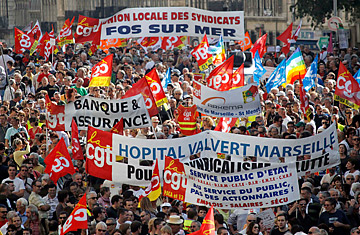
Private and public sector workers demonstrate over pension reforms in Marseille, France.
After weeks of protests, French President Nicolas Sarkozy's resolve seems to have prevailed over public opposition, and his badly needed, highly unpopular pension reform looks certain to become law. Still, on Thursday the French launched new demonstrations and strikes to show the government that the fight over the issue is far from over. But with lower turnout for the latest round of walkouts and marches indicating that the protest movement has begun to flag, the question now is whether the unions can fulfill their vows to continue their battle even after the bill has been signed into law — and if so, how.
The labor stoppages and demonstrations on Thursday had less impact and lower participation than the previous six national protest demonstrations that have been held since early September. Though Parisian airports canceled between 30% and 50% of flights, as they had on those previous occasions, rail traffic was only down by around 10% or 20% of normal levels, and most municipal transportation — including the Paris Metro — was working smoothly. The disruption caused by earlier industrial action had been far greater, with national and regional train services nearly halved, and many commuter and municipal lines brought to a crawl. Similarly, the total turnout for the 270 protest marches held across France on Thursday appeared to be far lower than the 3.5 million people who flocked to the streets on Oct.12, and probably shy of the 1.5 million to 2 million the other demonstrations had mobilized.
The lower turnout was something the unions had expected, noting that school holidays — which began Oct. 23 — would deprive corteges of the large contingent of students who had joined the movement earlier this month. "We know people are tiring a little, and that it's the vacation period," said Jean-Claude Mailly, head of the Confederation of French Labor union on France 2 television Thursday morning. "We're not going to break any records, but we will show pressure is being maintained and that the law isn't being accepted by people. I don't know what will happen in coming weeks, [but] this movement will continue."
While it's certain the school holidays sapped the opposition's forces on Thursday — and, happily, slashed the number of violent clashes with police that had occurred during previous protests — it probably wasn't the only reason for the lower turnout. On Monday, the upper house of parliament passed Sarkozy's reform bill, followed by the lower chamber Wednesday. With nothing left but vetting for constitutional compatibility and Sarkozy's signature to make the reform law, some observers said the government's timing had succeeded in convincing less militant opponents that further protests would be futile. And while workers continued their strikes at three of France's 12 refineries, employees who voted on Thursday to recommence operations brought the total number of refineries returning to work since Monday up to eight. The decision by those employees — who'd already sacrificed two weeks' pay to conduct their strikes — to end their walkout removed one of the major pressure points that opponents of the reform had on the government. And over the next 10 days it's also expected to ease the gas shortage that has left 20% to 30% of French service stations without fuel for the past two weeks.
Though there was never any doubt Sarkozy had the legislative muscle to drive the reform through the conservative-dominated parliament, the rising tide of opposition made some pundits wonder whether his government would mimic numerous predecessors by pulling its plans in the face of public hostility. Polls show nearly 80% of the public thinks reforming France's deficit-plagued pay-as-you-go pension system is necessary. Yet nearly two-thirds oppose Sarkozy's decision to make people pay into it for longer by raising the minimum retirement age from 60 to 62 years and the age to qualify for full pension from 65 to 67. And while support of the opposition movement to the plan has fallen from a high of 71% in mid-October, a new poll shows 65% backed protesters on the eve of Thursday's action.
It's for that reason that union leaders and leftist politicians vow to continue their efforts to challenge the reform. But after their impressive shows of force earlier this month — and strike activity that has cost the French economy $4.5 billion already — it's difficult to imagine the waning opposition front summoning enough additional strength to force Sarkozy from his unyielding defense of his reform, especially now that it's almost law. Some observers speculate that the unions won't risk annoying a generally supportive public with more strikes and endless demonstrations, but will instead seek to keep up resentment to the pension measure — and anger over Sarkozy ignoring popular opposition to it — as a weapon against other reforms the president says are on the way.
That should fill the months until the presidential elections in 2012, when opponents hope voters will punish Sarkozy's pension reform by lifting a Socialist candidate to the Elysee. At which point the unions will look to the Socialists to keep their recent pledge to simply repeal the contested changes, and find another way to finance France's retirement scheme.
